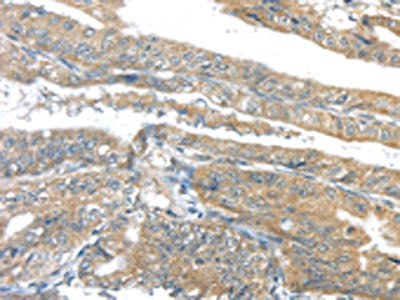
The image on the left is immunohistochemistry of paraffin-embedded Human esophagus cancer tissue using CSB-PA617669(AKT2 Antibody) at dilution 1/40, on the right is treated with synthetic peptide. (Original magnification: x200)
AKT2 Antibody

CSB-PA617669
ApplicationsELISA, ImmunoHistoChemistry
Product group Antibodies
ReactivityHuman
TargetAKT2
Overview
- SupplierCusabio
- Product NameAKT2 Antibody
- Delivery Days Customer20
- ApplicationsELISA, ImmunoHistoChemistry
- CertificationResearch Use Only
- ClonalityPolyclonal
- ConjugateUnconjugated
- Gene ID208
- Target nameAKT2
- Target descriptionAKT serine/threonine kinase 2
- Target synonymsHIHGHH; murine thymoma viral (v-akt) homolog-2; PKB beta; PKBB; PKBBETA; PRKBB; protein kinase Akt-2; protein kinase B beta; putative v-akt murine thymoma viral oncoprotein 2; rac protein kinase beta; RAC-BETA; RAC-beta serine/threonine-protein kinase; RAC-PK-beta; v-akt murine thymoma viral oncogene homolog 2
- HostRabbit
- IsotypeIgG
- Protein IDP31751
- Protein NameRAC-beta serine/threonine-protein kinase
- Scientific DescriptionThis gene is a putative oncogene encoding a protein belonging to a subfamily of serine/threonine kinases containing SH2-like (Src homology 2-like) domains. The gene was shown to be amplified and overexpressed in 2 of 8 ovarian carcinoma cell lines and 2 of 15 primary ovarian tumors. Overexpression contributes to the malignant phenotype of a subset of human ductal pancreatic cancers. The encoded protein is a general protein kinase capable of phophorylating several known proteins.
- ReactivityHuman
- Storage Instruction-20°C or -80°C
- UNSPSC12352203
